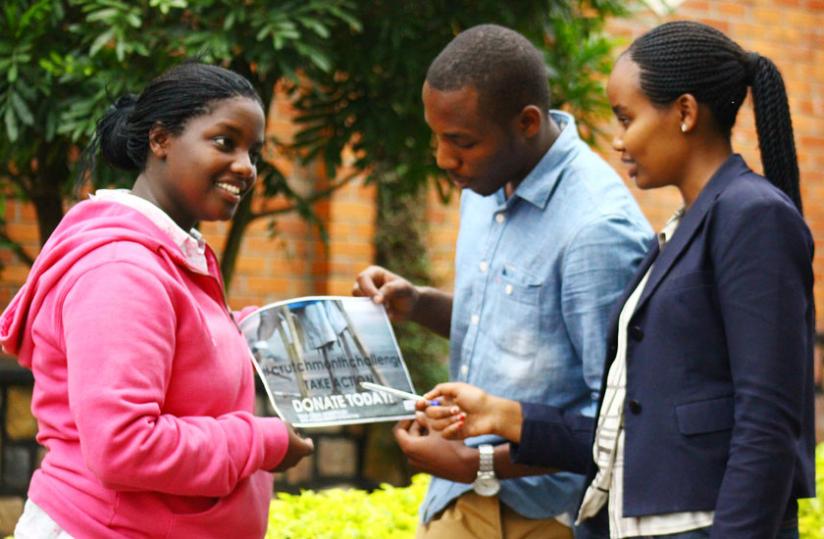Inspired by the international Ice Bucket Challenge that went viral on social media and saw everyone from Bill Gates to Christiano Ronaldo to Oprah Winfrey participate, 22-year-old Dominique Uwase Alonga started her own awareness campaign for the disabled called the Crutch Month Challenge.


Inspired by the international Ice Bucket Challenge that went viral on social media and saw everyone from Bill Gates to Christiano Ronaldo to Oprah Winfrey participate, 22-year-old Dominique Uwase Alonga started her own awareness campaign for the disabled called the Crutch Month Challenge. The campaign’s main aim is to raise money to help disadvantaged people with disabilities.
Born with primary Lymphedema (a rare illness that causes swelling in the arms or legs), it was very hard for Alonga to mingle freely with other children because they would make fun of her. As a result, her self esteem was completely destroyed, so much that at some point, she thought of quitting school. But with the support of her family, she soldiered on.
"There is currently no cure to lymphedema which of course makes things hard. But I have learned and I am still learning to rise above all challenges,” she says.
The cause
The inspiration behind Alonga’s campaign, the Ice Bucket Challenge, involves pouring a bucket of ice cold water on someone’s head to promote awareness of the disease amyotrophic lateral sclerosis (ALS).
The Crutch Month Challenge, however, does not involve ice cold water poured on the body. "I challenge someone right away. That person takes a picture with a poster that is written on "#crutchmonthchallenge” and also donates Rwf 500 or more. They can then challenge a friend to do the same with a specific deadline. If they meet the deadline, they only pay Rwf 500, if they don’t they pay Rwf 1500. It is also up to the challenger to follow up on those they challenged to make sure they gave to the cause,” Alonga explains.
The cheerful Alonga came up with the concept hoping to solicit enough funds to get beggars with disabilities off the streets. It is a way, she says, for the youth to get involved in a noble cause.
"We want to raise Rwf 500,000 per month. That can help with income generating activities and keep them from begging. The beneficiaries will also be given small business management skills that will help them in the long run.”
An artist and communication and public relations officer at Never Again Rwanda, Alonga says that Rwf 500 might seem like a small sum but it is enough to encourage people. A higher figure, according to her, might have not received a very warm welcome.
"We want this initiative to be funded by the youth and anybody who feels like supporting the cause. We receive anyone who wants to take part in it. We are so honored to have the support of the Minister of Culture and Sports, Hon Joseph Habineza and musician King James as well.
We have also had tremendous support from Never Again Rwanda and Royal FM. We are truly grateful,” Alonga says.
Alonga’s team of five that include, Archange Rwikwiza, Hero Shyaka, Jean Michel Nzakwituriki, and Copain Fabrice Bienaime, are currently hoping to help at least 15 beggars by donating crutches, wheelchairs, and prostheses.
"We have considered making this a charity or even nonprofit organisation. But we still need sufficient funds to make this happen. If this could happen, we would be able to support and mentor these people which would ensure their survival,” says Alonga.
Asked if she intends to involve other government leaders in the challenge, she says, "I like to dream big. My dream for this challenge is to see our President take a picture for the cause. We would be so honored! Leaders are as welcome as other individuals.”
Alonga adds that it would truly be a blessing if Rwandans, especially the youth, opened their hearts to this cause. "Rwf 500 is not a lot. We are the leaders of tomorrow and we should stand to make a change where it is noble.”
The beneficiaries
29-year-old Alain Habimana, a former air conditioning technician from Musanze town suffered serious damage resulting from an accident that left his spine broken.
"Before I broke my back, I had my own company, Level Technologies, a good job that paid the bills. But I lost everything and turned to begging on the streets of Musanze and receiving handouts from friends,” says Habimana who has a diploma in computer science.
"I believe that I can work as a technician in any organisation if the chance is given to me,” he adds. "And I want to express my gratitude to the organisers of the Crutch Month Challenge. I want to thank them for thinking about disabled people. I urge my fellow disabled people not to lose hope and have a focused mindset which can achieve a better life beyond their physical disabilities.”
***********************
What they say about the Crutch Month Challenge
King JamesI took the challenge because I’m a human being. I’m not doing it as celebrity or anything. I’m doing it because I want to help the disabled.
Pastor Antoine RutayisireMy daughter told me about the challenge, a campaign to help people with disabilities. I wish to be part of this good cause and I will support it as much as I can. I will follow them up and give them some advice should they need it. I also encourage the public to take on this good cause.
Joseph Habineza, Minister of Sports and CultureWhen I got to know the reason for the campaign, I had to take part. And I hope to challenge my colleagues.
It’s a good idea to help people with disabilities. Even the government, this is something we take at heart. My donation is a secret, I will reveal it to the organisers and I call on individuals, the public and private organisations to support the cause.


